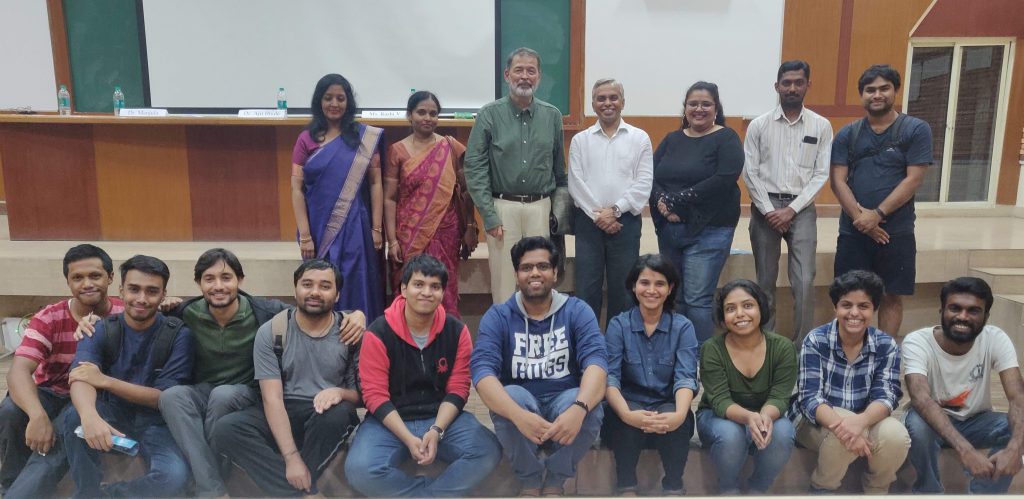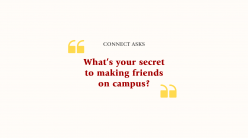
centre), and mental health professionals at an event in November 2019 (Photo courtesy: IISc Empaths)
“Do people in highly competitive spaces lack empathy?”
That was a question a student had for a panel of mental health professionals at an event on 9 November 2019 called Shades of Blue: Understanding Depression. With increased concerns about students’ mental health on campus (two students took their lives this year), this was a student-organised initiative to offer support and break the stigma that surrounds issues with mental health by talking about it more.
Is IISc doing enough for student welfare? Are students sensitive to the suffering of their peers? Is help available in times of a crisis? These are some of the questions that have been raised often in informal conversations on campus, and they formed the subtext to the student’s question about empathy. Suicide rates, the student pointed out, were high at other top institutions in India as well as at Ivy League universities in the USA. Does a focus on academic excellence mean a lack of humaneness in dealing with human problems?
Science and stress
Much recent conversation has centred around the stresses of academia and how young scientists’ struggles with mental health might be the result of structural causes. On the science media platform The Life of Science, Riddhi Dastidar writes, “What is it about Indian science today that leaves scholars unsupported and at risk of deteriorating mental health – contributing, in case of the worst outcome, to suicide?” Based on interviews with 20 scholars across eight institutes, including IISc, she identifies “a stressful, isolating, deeply hierarchical and unsupported academic environment, which seems almost designed to trigger mental illness, and completely at odds with the environment required to do innovative research – an intrinsically creative pursuit.”
This isn’t just an Indian problem. A recent article on Nature’s homepage is titled “PhDs: The tortuous truth”, which includes the results of a 2019 survey of over 6,300 graduate students from across the world and across scientific fields. Among its findings is that while most were satisfied with their decision to pursue a PhD, 76 percent of respondents worked over 40 hours a week (the majority working between 40 and 60 hours a week, and some even working over 80 hours a week), and this was taking a toll on their wellbeing and mental health – 36 percent had sought help for anxiety or depression related to their PhD.
But it is clear that issues with mental health aren’t just a feature in the sciences or academia. More and more people are considering the possibility that it is the way modern working lives are structured that leads to constant fatigue. Millennials have been termed the “burnout generation”, having to be constantly productive in jobs that one is “passionate” about, even though these jobs may have few benefits and low pay and security. “Workism” in white-collar jobs – the belief that work is necessary for the economy but also central to one’s identity and purpose – has been identified as a source of distress. Although much of these analyses have been of American society, it is easy to spot elements of these in Indian society and work culture, and to see how it affects Indians too.
Which leads to the question – what can be done to improve work cultures and environments at Indian institutes such as IISc? And how can the Institute community make sure that everyone has access to the right support to stay mentally healthy?
The Empaths
When a student asked the aforementioned question about competitive places lacking empathy at Shades of Blue, a member of the panel – Vyjayanthi Subramanian, Associate Professor of Psychiatry at MS Ramaiah Hospital and consulting psychiatrist at IISc – said, “Empathy can be learnt.” She added that human connectedness was as important as professional achievements, and that empathy was something that could be taught and developed, in the way that one learns other life skills.

Emphasising the importance of empathy, different groups of students have been trying to create a culture of support at IISc. One group launched an initiative during Mental Health Week in October called ChinUpandGreet – encouraging students to greet each other with a smile, in order to help create a friendlier, livelier campus.
Another group began its efforts with the creation of a closed Facebook group called the IISc Survivor Diaries, where students can anonymously share their experiences – of trauma; of depression and suicidal thoughts; of emotional pain. “We all need a safe space to express our inner struggle, shed feelings of shame, and find the courage and capacity to be vulnerable,” says Rakshita Joshi, a PhD student at IISc and one of the creators of the group. IISc Survivor Diaries creates a confidential space for students to speak about what they’re going through and in the process chips away at the silence around mental health. Only verified IISc students with an ID number can join the group, and comments on posts are moderated. The only non-student member of the group is one of IISc’s counsellors, who comments on posts to offer words of support and affirmation.
We all need a safe space to express our inner struggle, shed feelings of shame, and find the courage and capacity to be vulnerable
Because a few of the group’s creators had shared their own stories and waived their anonymity in doing so, they became identifiable among other students as being empathetic to mental health issues. They were sometimes called upon to deal with distress among students, though they weren’t always equipped to. In October this year, the group’s creators, along with a few other volunteers, received training to respond to students in distress from Subramanian. Formed as a peer support group under a newly set up Wellness Centre Committee, they are called the Empaths, and describe themselves as a “baseline structure to facilitate better mental health in the community”, supported by professional counsellors and psychiatrists. They’re still evolving, they caution, but aim to be a campus-wide network of trained student volunteers to provide a parallel platform for students to reach out and share their concerns, as well as organise outreach activities and events to spread awareness about mental health issues.
Shades of Blue was the first initiative by the Empaths, and the first of a series of events on campus to discuss mental health issues. Held on a Saturday evening with a considerable audience, the event began with a few students sharing experiences of overcoming depression and suicidal thoughts, speaking with emotional honesty, maturity, and at times even with humour about their struggles. This was followed by a series of questions answered by panelists, some collected before the event, some submitted anonymously by the audience members present, and some put to panelists directly. The panel consisted of Subramanian, Ajit V Bhide, Head of the Department of Psychiatry at St Martha’s Hospital, M Manjula, Professor of Clinical Psychology at NIMHANS, and Rashi Vidyasagar, Director of the Alternative Story, an organisation that provides mental health services in Bangalore. The questions and the discussions that followed showed the many ways that mental health can be addressed at the institutional, community and individual levels.
Top-down efforts
According to a Nature editorial accompanying the results of its 2019 PhD survey, “The solution to this emerging [mental health] crisis does not lie solely in institutions doing more to provide on-campus mental-health support and more training for supervisors – essential though such actions are. It also lies in recognizing that mental ill-health is, at least in part, a consequence of an excessive focus on measuring performance – something that funders, academic institutions, journals and publishers must all take responsibility for.” Changing this system sounds like nothing short of a total overhaul, and the road to get there is perhaps a long and difficult, albeit necessary, one.
Changing this system sounds like nothing short of a total overhaul, and the road to get there is perhaps a long and difficult, albeit necessary, one
At IISc, for example, perhaps the most obvious first step is to provide access to professional counselling and psychiatric services on campus. Students have been pushing for the setting up of a Wellness Centre on campus dedicated to mental health, with consulting psychiatrists and counsellors following professional standards such as maintaining patient confidentiality, overseen by a Wellness Centre Committee that has representatives from faculty, students, and mental health professionals. “Establishing better support systems including the hiring process [for more mental health professionals on campus] is expected to start soon,” says Vishwesha Guttal, Associate Professor at the Centre for Ecological Sciences and a member of the Committee. Rudra Pratap, IISc’s Deputy Director, addressed the students at Shades of Blue saying that the physical infrastructure for the Centre was already being planned and emphasising the management’s “100 percent” commitment to improving the wellbeing of the community on campus.
Changes in Research Culture
The Nature editorial also says, “[T]he truth is that the system is making young people ill and they need our help. The research community needs to be protecting and empowering the next generation of researchers. Without systemic change to research cultures, we will otherwise drive them away.”
To a question from an audience member at Shades of Blue about how changes to space and environment might affect one’s mental health, Vidyasagar said that one way to make labs and common areas more welcoming towards people with mental illnesses was to have posters displayed prominently, featuring information about helplines, resources and whom to contact for mental health services. This, she said, would enable conversations about mental health as well as provide support to those searching for it, making mental health less of a taboo subject.
Subramanian firmly believes that faculty have a large role to play in deciding research culture and setting the tone for interactions in the lab. Encouraging an overly competitive culture and student rivalries, picking favourites, and power plays all contribute to a toxic environment, she says, while encouraging students and being careful about the way in which feedback is delivered can contribute to a positive one.
Some faculty members have also expressed a desire to receive training on how to deal with students’ problems. Narmada Khare, an instructor in the undergraduate programme, wrote in the September 2019 issue of Connect that issues with mental health and emotional breakdowns were a common concern. “Instructors are willing to help, but are untrained. My colleagues and I often have a tremendous feeling of helplessness, hopelessness. We have tried to help students in great distress, but we aren’t equipped.”
“The only thing faculty were trained in when we were students and postdocs,” says Guttal, “is how to do good research, how to publish well and how to make a name for yourself in your field.” He points out that when a new faculty member sets up a lab, it can be easy to be consumed by a focus on research and the logistics of setting up a lab, and therefore actively thinking about what it means to be a leader or mentor often gets sidelined. “There is bound to be a huge variation in what everyone does, partly based on their experience and what they think is the right way of doing things, for want of training on how to be a good leader in the lab. Some people think strict discipline is the way to go. With the culture of publish or perish, that can easily slip into a toxic environment. Others might take a more liberal approach by mentoring students to choose their own path and trying to empower them in the process.” He believes that active mentoring of young faculty would be a step towards helping them building a positive and productive lab culture, as well as having more discussions among faculty and students about why some approaches work better than others.
In the meanwhile, the Empaths are pushing for more discussion at multiple levels. At Shades of Blue, people talked about the difference between being sad and being depressed. They talked about how depression didn’t necessarily lead to suicide, and how suicide didn’t necessarily have to be a result of mental illness. They talked about a range of factors that contribute to poor mental health including adverse childhood experiences or discrimination based on gender, caste, sexuality and economic background. They talked about the misconception that depression happens to “other people”, not to oneself. They shared a pamphlet with information on symptoms of depression, when and how to seek help, how to offer support to someone else (including what not to say) and whom to reach out to on campus for professional help. And they conveyed the message that while there may not be a one-size-fits-all solution for everyone’s problems, there were certainly people on campus who cared – and were willing to help.
Dr Vyjayanthi Subramanian’s tips for faculty on building a positive lab environment
- Students look up to faculty and take behavioural cues from them, so it is important to think about the impact of one’s actions. Insulting a student in front of others, for example, makes other students think it is okay to do the same.
- When giving feedback on a student’s work, start by appreciating its strengths and give praise where it is due before moving on to what can be improved.
- If you have negative feedback, make sure that it is not personal, so that it is clear you are critiquing the work and not the students themselves. This can also be delivered in person rather than publicly.
- Times are different and young people today may have different habits, values and methods of working than what you grew up with. Accept this rather than hold it against them. Try not to be judgemental and try not to police them for it.
- Begin each day in the lab by ensuring that everyone greets each other, smiles, and makes eye contact. Collectively go over what was done the previous day or what will be done today, perhaps over tea or coffee. Have lunch together, as a lab or as a department, at least once a month. This encourages talking, exchanging ideas, and sharing thoughts and feelings. This way you get to know about people and their backgrounds, humanise your atmosphere, and leave channels open for communication in the event that someone would like to reach out for help.
- The more you reinforce empathy, the more you will build it.
- To understand what your students might be going through, try a group activity like role-play. You could play a victim or an individual with depression or anxiety. Guide and student can interchange roles and this can be hilarious and break the ice, while also putting you in their shoes, however briefly.
Tips (for all) on building emotional resilience
- If you are being encouraged to compete against others where it isn’t necessary, you have to identify it and consciously decide not to participate in it. You have to understand the limitations of competition and say, “I will be my own competition”.
- Make sure that rivalries do not dilute your friendships.
- Take the time to identify and acknowledge your feelings. Don’t ignore or suppress your feelings so that your job gets completed. It isn’t necessary to always compartmentalise your emotions and lock them away, which is what we often do in our day-to-day lives. It’s fine if your emotions spill over once in a while – over a period of time, the “spillage” becomes less because it has found its vent.
- Make feelings and emotions a part of your everyday vocabulary. This could mean saying something like, “Oh, even you’re feeling weepy-weepy? I went through that spell last week.”
- Try to keep your sights on the bigger picture. No test can really assess an individual or his or her capacities. There is life beyond the lab, beyond IISc, beyond science.
- Try not to isolate yourself or push other people away. Your friends and loved ones will help build resilience in you. They may not be able to solve your problems, but they can help you feel better about them.
- Try not to avoid problems; try to find solutions to them and deal with them head on.
For mental health support, here’s whom you can contact:
The Empaths:
iiscsurvivordiaries@gmail.com
Consulting psychologists at Faculty Club:
Shridhar BG (8904335065, shridharbg@iisc.ac.in)
Savitha MS (9741503499, savitams@iisc.ac.in)
Consulting psychiatrist at the Health Centre:
Dr Vyjayanthi Subramanian
(Timings: 2-5 pm on Tuesdays and Thursdays)
To view resources put together by the Empaths and Shridhar BG, scan this QR code:





